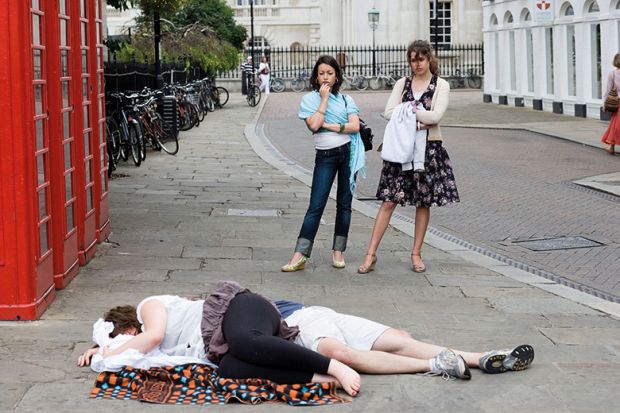New undergraduates who drink less than the average are more likely to drop out, Danish researchers have found, potentially because they fail to fit in during boozy university induction weeks.
Higher education institutions in many countries have long worried that alcohol-fuelled initiations exclude some students, making it hard for them to find new friends and build support networks, and this new study provides evidence that their fears are well founded.
Bjarke Tarpgaard Hartkopf, who led the research project at the Danish Evaluation Institute, an education thinktank, explained that “alcohol has a special role” when Danish undergraduates start their studies.
Typically, Danish students spend three to four days partying in a cottage in the countryside, often drinking heavily, as part of their induction. Sometimes students are pushed to drink, even if they don’t want to, he explained.
“If you don’t drink, and if for this reason you cannot be part the activities...you may not be so well integrated socially,” he said. “Many students are in a vulnerable situation in which they have to make new friends.”
Mr Hartkopf’s analysis looked at survey data from more than 14,000 new Danish undergraduates, who were asked about their first weeks of university life, including how many days a month they typically drank more than five units of alcohol.
The students least likely to have dropped out by the following February were those who drank “moderately” – although “moderately” is a relative term here. The authors deliberately chose not to publish how much “moderate” student drinkers drank, as “it was quite a lot” and they feared it might be used as a “recommendation” for students looking to fit in at university, he said.
But heavier and lighter drinkers were 2 percentage points more likely to drop out, the analysis found. “That's quite something,” he said, given that the average dropout rate is about 6 per cent.
An association between low drinking and dropping out does not necessarily mean the former causes the latter, Mr Hartkopf cautioned.
But given how important alcohol is in early socialising at Danish universities, it is possible that sobriety makes it harder to fit in, leading to higher dropout rates, he said.
Search our database for the latest global university jobs
The findings have provoked a lot of interest in the Danish press, he said, but no universities have yet responded by cracking down on boozy cottage getaways. It is unclear what universities can do about the issue, as “in many places it’s students that plan these activities, so it’s up to them. So it’s not very controlled from the institutional side,” he added.
The question is going to be increasingly important as students from different cultural backgrounds, for whom drinking is less central or even forbidden, make up a greater proportion of the student body, Mr Hartkopf said.
“If you're in that position [not wanting to drink], you're in a difficult position,” he said.
In 2012, Malcolm Gillies, who was then vice-chancellor of London Metropolitan University, suggested banning alcohol from parts of the campus because of its large Muslim population. But his suggestion provoked a backlash, including from the student union, which accused him of making generalisations about Muslim students’ beliefs.
Register to continue
Why register?
- Registration is free and only takes a moment
- Once registered, you can read 3 articles a month
- Sign up for our newsletter
Subscribe
Or subscribe for unlimited access to:
- Unlimited access to news, views, insights & reviews
- Digital editions
- Digital access to THE’s university and college rankings analysis
Already registered or a current subscriber? Login





